Volkswagen has taken the wraps off its NMS – new mid-size sedan – and surprise it’s a plain looking Passat. True, it’s the largest Passat since its 1987 debut in a segment long dominated by the Japanese Big Three – Toyota Camry, Honda Accord, and Nissan Altima.
VW has been promising that this Passat is finally right for the American market, and it will mark the return of VW as more than a small player since the day when it dominated U.S. imports with the Beetle.
Since 1987, more than 700,000 Passats have been sold here cumulatively. The Japanese Big Three sell that many of their similar sized family cars in a year.
VW’s ambitious plans promise that one million new generation U.S. Passats will be sold during next seven years after production starts at a new plant in, Chattanooga, Tennessee this August. Passat is part of a grandiose VW plan to sell 800,000 VW models annually in the States by 2018. In the USA, all VW Group brands delivered 360,300 (298,000) units during the twelve-month 2010 period, corresponding to growth of 20.9%. VW brand sold about 257,000 of those, its best year since 2003 with only a little over 12,000 of the sales comprised of Passats. VW’s U.S. market share is a mere 2%.
The new Passat is larger, with a length of 191.7 inches (4,868 mm), wheelbase of 110.4 inches (2,803 mm); and a width 72.2 inches (1,835 mm). VW is making much of rear seat room. And taking a page from the original Japanese play book, most recently used by Hyundai on its Sonata sedan, Passat will start under $20,000.
The base Passat has a powerful (170 hp/177 lb.-ft.) five-cylinder gasoline engine. Engine options include a four-cylinder turbocharged diesel (TDI) with (140 hp/236 lb.-ft.), which could pass 40 mpg on the highway when EPA testing is complete, and a six-cylinder gasoline fueled VR6 with (280 hp/258 lb.-ft.), which should make it a very quick car around town.
But is quick enough to take on the well entrenched Japanese? It will be an expensive marketing challenge at VW that will need to overcome longstanding consumer attitudes about VW’s low quality, higher prices, and poor dealership service.


